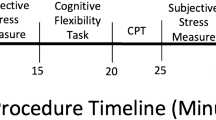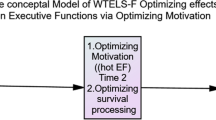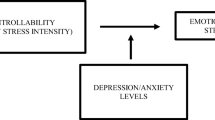Abstract
Better executive functioning may be associated with more adaptive stress responses than worse executive functioning, potentially due to less propensity for rumination. In this study, we tested the hypothesis that better executive functioning would be associated with decreased total cortisol output (AUCg) and cortisol sensitivity with respect to increase/decrease (AUCi) in response to a stressor, and that this association is mediated by stress task rumination. Participants completed measures of inhibition, updating/monitoring, and cognitive flexibility, a social-evaluative stressor, and a self-report measure of rumination about the stressor. Participants provided saliva samples at six time points to measure cortisol output and sensitivity. Cognitive flexibility was negatively associated with stress task rumination (r = − .30, p < .05); however, this association was no longer significant when adding covariates (i.e., participant age, sex, highest education, and body mass index) to a regression model. Cognitive flexibility was also associated with AUCg (r = − .28, p < .05), while rumination was associated with AUCi in non-adjusted (r = .28, p < .05) and adjusted (b = .81, p < .05) analyses. Furthermore, females demonstrated better cognitive flexibility (r = .26, p < .05) and lower AUCg (r = − .45, p < .05) compared to males. Findings demonstrate the importance of cognitive flexibility and rumination when predicting dynamic measures of stress-induced cortisol over time.


Similar content being viewed by others
References
Allan, J. L., McMinn, D., & Daly, M. (2016). A bidirectional relationship between executive function and health behavior: Evidence, implications, and future directions. Frontiers in Neuroscience, 10, 386. https://doi.org/10.3389/fnins.2016.00386
Butler, L. D., & Nolen-Hoeksema, S. (1994). Gender differences in responses to depressed mood in a college sample. Sex Roles, 30(5), 331.
Champaneri, S., Xu, X., Carnethon, M. R., Bertoni, A. G., Seeman, T., DeSantis, A. S., et al. (2013). Diurnal salivary cortisol is associated with body mass index and waist circumference: The multi-ethnic study of atherosclerosis. Obesity (Silver Spring), 21(1), E56–E63. https://doi.org/10.1002/oby.20047
Chan, R. C., Shum, D., Toulopoulou, T., & Chen, E. Y. (2008). Assessment of executive functions: Review of instruments and identification of critical issues. Archives of Clinical Neuropsychology, 23(2), 201–216. https://doi.org/10.1016/j.acn.2007.08.010
Davis, R. N., & Nolen-Hoeksema, S. (2000). Cognitive inflexibility among ruminators and nonruminators. Cognitive Therapy and Research, 24(6), 699–711.
Delis, D. C., Kaplan, E., & Kramer, J. (2001). Delis-Kaplan Executive Function System. San Antonio: Psychological Corporation.
Diamond, A. (2013). Executive functions. Annual Review of Psychology, 64, 135–168. https://doi.org/10.1146/annurev-psych-113011-143750
Dickerson, S. S., & Kemeny, M. E. (2004). Acute stressors and cortisol responses: A theoretical integration and synthesis of laboratory research. Psychological Bulletin, 130(3), 355–391. https://doi.org/10.1037/0033-2909.130.3.355
Edwards, S. L., Rapee, R. M., & Franklin, J. (2003). Postevent rumination and recall bias for a social performance event in high and low socially anxious individuals. Cognitive Therapy and Research, 27(6), 603–617.
Fekedulegn, D. B., Andrew, M. E., Burchfiel, C. M., Violanti, J. M., Hartley, T. A., Charles, L. E., et al. (2007). Area under the curve and other summary indicators of repeated waking measurements. Psychosomatic Medicine, 69(7), 651–659. https://doi.org/10.1097/PSY.0b013e31814c405c
Fiocco, A. J., Joober, R., & Lupien, S. J. (2007). Education modulates cortisol reactivity to the trier social stress test in middle-aged adults. Psychoneuroendocrinology, 32(8–10), 1158–1163. https://doi.org/10.1016/j.psyneuen.2007.08.008
Franklin, P., Tsujimoto, K. C., Lewis, M. E., Tekok-Kilic, A., & Frijters, J. C. (2018). Sex differences in self-regulatory executive functions are amplified by trait anxiety: The case of students at risk for academic failure. Personality and Individual Differences, 129, 131–137. https://doi.org/10.1016/j.paid.2018.03.019
Gianferante, D., Thoma, M. V., Hamlin, L., Chen, X., Breines, J., Zoccola, P. M., et al. (2014). Post-stress rumination predicts HPA axis responses to repeated acute stress. Psychoneuroendocrinology, 49, 244–252. https://doi.org/10.1016/j.psyneuen.2014.07.021
Ginty, A. T., Phillips, A. C., Roseboom, T. J., Carroll, D., & Derooij, S. R. (2012). Cardiovascular and cortisol reactions to acute psychological stress and cognitive ability in the Dutch famine birth cohort study. Psychophysiology, 49(3), 391–400. https://doi.org/10.1111/j.1469-8986.2011.01316.x
Gratz, K. L., & Roemer, L. (2004). Multidimensional assessment of emotion regulation and dysregulation: Development, factor structure, and initial validation of the difficulties in emotion regulation scale. Journal of Psychopathology and Behavioral Assessment, 26(41), 41–54. https://doi.org/10.1023/B:JOBA.0000007455.08539.94
Grissom, N. M., & Reyes, T. M. (2019). Let’s call the whole thing off: Evaluating gender and sex differences in executive function. Neuropsychopharmacology, 44, 86–96. https://doi.org/10.1038/s41386-018-0179-5
Hayes, A. F. (2013). Introduction to Mediation, Moderation, and Conditional Process Analysis: a Regression-Based Approach. New York: Guilford Press.
Heaton, R. K., & Staff, P. A. R. (2003). Wisconsin Card Sorting Test: Computer version 4. Odessa: Psychological Assessment Resources.
Hofmann, W., Schmeichel, B. J., & Baddeley, A. D. (2012). Executive functions and self-regulation. Trends in Cognitive Sciences, 16(3), 174–180. https://doi.org/10.1016/j.tics.2012.01.006
IBM (2017). IBM SPSS Statistics for Windows, Version 25.0. Armonk, NY: IBM Corp.
Johnson, D. P., & Whisman, M. A. (2013). Gender differences in rumination: A meta-analysis. Pers Individ Dif., 55(4), 367–374. https://doi.org/10.1016/j.paid.2013.03.019
Joorman, J., Dkane, M., & Gotlib, I. H. (2006). Adaptive and maladaptive components of rumination? Diagnostic specificity and relation to depressive biases. Behavior Therapy, 37(3), 269–280. https://doi.org/10.1016/j.beth.2006.01.002
Joorman, J., & Gotlib, I. (2010). Emotion regulation in depression: Relation to cognitive inhibition. Cognition and Emotion, 24(2), 281–298. https://doi.org/10.1080/02699930903407948
Jose, P. E., & Brown, I. (2008). When does the gender difference in rumination begin? Gender and age differences in the use of rumination by adolescents. Journal of Youth and Adolescence, 37(2), 180–192. https://doi.org/10.1007/s10964-006-9166-y
Kirschbaum, C., Pirke, K. M., & Hellhemmer, D. H. (1993). The ‘Trier Social Stress Test’- a tool for investigating psychobiological stress responses in a laboratory setting. Neuropsychobiology, 28(1–2), 76–81. https://doi.org/10.1159/000119004
Kirschbaum, C., Wolf, O. T., May, M., Wippich, W., & Hellhammer, D. H. (1996). Stress- and treatment-induced elevations of cortisol levels associated with impaired declarative memory in healthy adults. Life Sciences, 58(17), 1475–1483. https://doi.org/10.1016/0024-3205(96)00118-X
Krieger, D. T., Allen, W., Rizzo, F., & Krieger, H. P. (1971). Characterization of the normal temporal pattern of plasma corticosteroid levels. The Journal of Clinical Endocrinology & Metabolism, 32(2), 266–284. https://doi.org/10.1210/jcem-32-2-266
Kudielka, B. M., & Kirschbaum, C. (2005). Sex differences in HPA axis responses to stress: A review. Biological Psychology, 69(1), 113–132. https://doi.org/10.1016/j.biopsycho.2004.11.009
Latzman, R. D., & Markon, K. E. (2010). The factor structure and age-related factorial invariance of the Delis-Kaplan executive function system (D-KEFS). Assessment, 17(2), 172–184. https://doi.org/10.1177/1073191109356254
Lee, B. K., Glass, T. A., McAtee, M. J., Wand, G. S., Bandeen-Roche, K., Bolla, K., et al. (2007). Associations of salivary cortisol with cognitive function in the Baltimore Memory Study. Archives of General Psychiatry, 64(7), 810–818.
Lundberg, U. (2005). Stress hormones in health and illness: The roles of work and gender. Psychoneuroendocrinology, 30(10), 1017–1021. https://doi.org/10.1016/j.psyneuen.2005.03.014
McEwen, B. (1998). Protective and damaging effects of stress mediators. The New England Journal of Medicine, 338, 171–179. https://doi.org/10.1056/NEJM199801153380307
Messay, B. (2014). Individual differences in goal adjustment ability and magnitude of emotional and autonomic responses to an unsolvable anagram task (Doctoral dissertation). Retrieved from semanticscholar.org.
Mezulis, A. H., Abramson, L. Y., & Hyde, J. S. (2002). Domain specificity of gender differences in rumination. Journal of Cognitive Psychotherapy, 16(4), 421–434. https://doi.org/10.1891/jcop.16.4.421.52524
Miyake, A., Friedman, N. P., Emerson, M. J., Witzki, A. H., & Howerter, A. (2000). The unity and diversity of executive functions and their contribution to complex “frontal lobe” tasks: A latent variable analysis. Cognitive Psychology, 41(1), 49–100. https://doi.org/10.1006/cogp.1999.0734
Newcomer, J. W., Selke, G., Melson, A. K., Hershey, T., Craft, S., Richards, K., et al. (1999). Decreased memory performance in healthy humans induced by stress-level cortisol treatment. Archives of General Psychiatry, 56(6), 527–533. https://doi.org/10.1001/archpsyc.56.6.527
Nolen-Hoeksema, S. (2012). Emotion regulation and psychopathology: The role of gender. Annual Review of Clinical Psychology, 8(1), 161–187.
Pruessner, J. C., Kirschbaum, C., Meinlschmid, G., & Hellhammer, D. H. (2003). Two formulas for computation of the area under the curve represents measures of total hormone concentration versus time-dependent change. Psychoneuroendocrinology, 28, 916–931. https://doi.org/10.1016/S0306-4530(02)00108-7
Quax, R. A., Manenschijn, L., Koper, J. W., Hazes, J. M., Lamberts, S. W., van Rossum, E. F., et al. (2013). Glucocorticoid sensitivity in health and disease. Nature Reviews Endocrinology, 9, 670–686. https://doi.org/10.1038/nrendo.2013.183
Richardson, J. T. (2007). Measures of short-term memory: A historical review. Cortex, 43(5), 635–650. https://doi.org/10.1016/s0010-9452(08)70493-3
Roelfsema, F., van Heemst, D., Iranmanesh, A., Takahashi, P., Yang, R., & Veldhuis, J. D. (2017). Impact of age, sex, and body mass index on cortisol secretion in 143 healthy adults. Endocrine Connections, 6(7), 500–509. https://doi.org/10.1530/EC-17-0160
Schmeichel, B. J., & Tang, D. (2015). Individual differences in executive functioning and their relationship to emotional processes and responses. Current Directions in Psychological Science, 24(2), 93–98. https://doi.org/10.1177/0963721414555178
Shields, G. S., Bonner, J. C., & Moons, W. G. (2015). Does cortisol influence core executive functions? A meta-analysis of acute cortisol administration effects on working memory, inhibition, and set-shifting. Psychoneuroendocrinology, 58, 91–103.
Slattery, M. J., Grieve, A. J., Ames, M. E., Armstrong, J. M., & Essex, M. J. (2013). Neurocognitive function and state cognitive stress appraisal predict cortisol reactivity to an acute psychosocial stressor in adolescents. Psychoneuroendocrinology, 38, 1318–1327. https://doi.org/10.1016/j.psyneuen.2012.11.017
Snyder, H. R., Miyake, A., & Hankin, B. L. (2015). Advancing understanding of executive function impairments and psychopathology: bridging the gap between clinical and cognitive approaches. Frontiers in Neuroscience, 6, 328. https://doi.org/10.3389/fpsyg.2015.00328
Stawski, R. S., Almeida, D. M., Lachman, M. E., Tun, P. A., & Rosnick, C. B. (2010). Fluid cognitive ability is associated with greater exposure and smaller reactions to daily stressors. Psychology and Aging, 25(2), 330–342. https://doi.org/10.1037/a0018246
Stroop, J. R. (1935). Studies of interference in serial verbal reaction. Journal of Experimental Psychology, 18, 643–662.
Tamres, L. K., Janicki, D., & Helgeson, V. S. (2002). Sex differences in coping behavior: A meta-analytic review and an examination of relative coping. Personality and Social Psychology Review, 6(1), 2–30. https://doi.org/10.1207/S15327957PSPR0601_1
Verkuil, B., Brosschot, J. F., Gebhardt, W. A., & Thayer, J. F. (2010). When worries make you sick: A review of perseverative cognition, the default stress response, and somatic health. Journal of Experimental Psychopathology, 1(1), 87–118. https://doi.org/10.5127/jep.009110
Wechsler, D. (2008). Wechsler Adult Intelligence Scale (4th ed.). San Antonio: Pearson Assessment.
Williams, P. G., Suchy, Y., & Rau, H. K. (2009). Individual differences in executive functioning: Implications for stress regulation. Annals of Behavioral Medicine, 37, 126–140. https://doi.org/10.1007/s12160-009-9100-0
Yang, Y., Cao, S., Shields, G. S., Teng, Z., & Liu, Y. (2016). The relationships between rumination and core executive functions: A meta-analysis. Depression and Anxiety, 34(1), 37–50. https://doi.org/10.1002/da.22539
Zoccola, P. M., & Dickerson, S. S. (2012). Assessing the relationship between rumination and cortisol: A review. Journal of Psychosomatic Research, 73(1), 1–9.
Zoccola, P. M., Dickerson, S. S., & Zaldivar, F. P. (2008). Rumination and cortisol responses to laboratory stressors. Psychosomatic Medicine, 70(6), 661–667. https://doi.org/10.1097/PSY.0b013e31817bbc77
Acknowledgements
The assistance of the Biomarker Core Lab in the College of Health and Human Development at The Pennsylvania State University with measurment of cortisol is greatly appreciated.
Author information
Authors and Affiliations
Corresponding author
Ethics declarations
Conflict of interest
Jasmin E. Guevara and Kyle W. Murdock declare that they have no conflict of interest.
Human and animal rights and Informed Consent
All procedures performed in this study were in accordance with the ethical standards of the Pennsylvania State University Institutional Review Board and with the 1964 Declaration of Helsinki and its later amendments or comparable ethical standards. This article does not contain any studies with animals performed by any of the authors.
Additional information
Publisher's Note
Springer Nature remains neutral with regard to jurisdictional claims in published maps and institutional affiliations.
Rights and permissions
About this article
Cite this article
Guevara, J.E., Murdock, K.W. Executive functioning and rumination as they relate to stress-induced cortisol curves. J Behav Med 43, 829–838 (2020). https://doi.org/10.1007/s10865-019-00119-z
Received:
Accepted:
Published:
Issue Date:
DOI: https://doi.org/10.1007/s10865-019-00119-z




